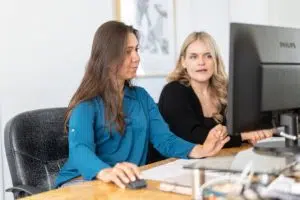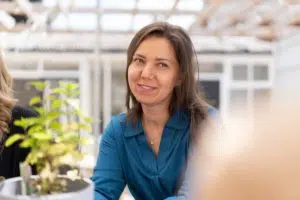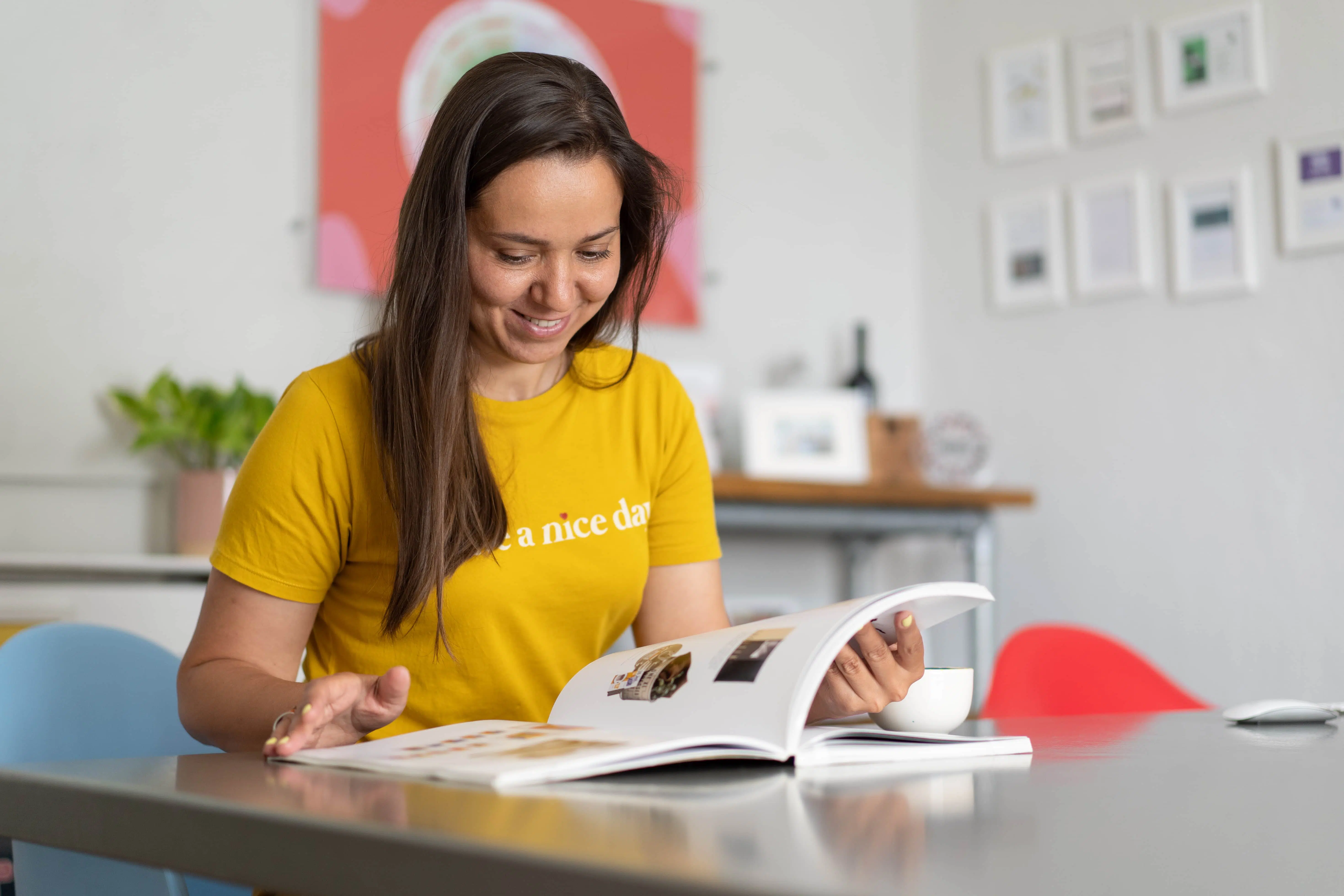Aleksandra Shevchenko is currently doing work experience as a designer in the Studio at Mackman. She is a talented artist, recently winning a Lavenham art contest for a Jubilee portrait of the Queen painted using coffee. Aleksandra arrived in the UK in April through the Government’s Homes for Ukraine scheme. She is originally from Kryvyi Rhy, near Mykolaiv, in Ukraine, and is now living in Acton with a host family. Rachel Hill and Eleanor Joyce from our Content & Communications team spoke to Aleksandra over a coffee to find out how she’s finding her placement at Mackman so far – the following is a transcript of the conversation.
RH: To start off with, how did you come to Suffolk?
AS: It was because of a friend from my childhood. We went to kindergarten together, and after some time we met again and he knew my host. They worked together in 2011. I called my friend because I wanted to leave Ukraine, and I wanted to be in a place where people speak English. I contacted this friend and he told me, “Just a few days ago, my friend who lives in England told me he’s looking to help someone from Ukraine,” and he thought I would be interested. And then we contacted each other, we spoke just a little bit, then sent pictures to each other and found out about each other’s habits and preferences to make sure we were a good fit.
When we knew each other better, they filled all the forms, and on the 23rd of March he filled out all the applications for Homes for Ukraine, and then sent them to me. I filled in from my side, and submitted as well, the same day. The situation in my city was worse than before. I left on the 10th April, but my husband stays in Ukraine still. On the 11th April, I crossed the border and I went to Poland, and my host helped me to spend 11 days there until I got my visa. Then when I got a visa, I flew from Poland to Stansted Airport. He picked me up from there and brought me home to meet with his wife and then later his children.
How did you find Mackman?
AS: I’ll tell you two ways I found Mackman. On my first or second day in the UK, I spoke with my hosts, and they asked me what I do in Ukraine. I told them I’m a graphic designer, and they said they have a friend who’s a graphic designer at Mackman. So firstly I heard from someone who was working at Mackman, and then I found an email address and sent my CV and portfolio in. Completely separately, I met my contact at the Job Centre, and she asked whether I had sent in a CV to Mackman. She actually called Mackman in front of me and she got a call with Chloe (Senior Designer at Mackman)!
I came in for an interview and asked the team some questions because I understand that the field of graphic design is different in Ukraine to the way it is here. Chloe told me that you use Macs, and Adobe InDesign – at least Photoshop and Illustrator is something I know. After that conversation, I thought I would try to get on a course in InDesign somewhere else, maybe at West Suffolk College. I had a few appointments at the Job Centre, and they asked how I was doing. I said that the employees at Mackman were so friendly, and then I got a call and Mackman asked if I’d like to have work experience. I said of course I would, and I came to start learning design and see how the guys work.
RH: What have you learned so far at Mackman?
AS: Chloe has a really keen eye for everything because I see how she helps the team, suggesting how to change things and improve them. Today I asked her if I could design a poster for my art exhibition, and she said yes, but only if you use InDesign! I started to do it, and then she just came and started to move things around and advised me what to do. It was just really, really incredible.
“Graphic design I consider mostly as work, but painting is my life.”
EJ: So it’s been a bit of a learning curve with all the different software?
AS: Yes, just because Adobe for Windows and Adobe for Mac work in a different way. Even at home, I don’t have InDesign, but I have Photoshop. I’m still getting used to the different shortcuts!
EJ: Do you prefer creating art on a computer or on paper?
Definitely working with paper – with canvases, brushes and things. I prefer that to graphic design because graphic design I consider mostly as work, but painting is my life. So even in Ukraine, when I was working as a graphic designer, during weekends, I spent them painting, sometimes painting murals with my friend.
RH: So you started painting portraits with coffee?
AS: Firstly, I started to paint coffee portraits in Ukraine, starting with friends. Someone said, “Oh, this is nice”, and so then I did it for commissions as well. Then I went to Dubai and Egypt. I was working there and then even the manager of our hotel was like, “You can paint!” He said, “If you do a nice portrait maybe I will ask you to do something for someone else.” I painted it for him and he really liked it. He asked me to paint this coffee portrait for our CEO, and when our chairman came to our hotel, I presented his portrait and he also liked it.
So then, my mum called me and told me that in a few days we would have an ‘artist day’ in Ukraine. She said, “Why don’t you send your pictures to a TV show?” So I sent them, and I also sent a coffee portrait, and it was displayed on Ukrainian TV. I don’t consider coffee painting as something that is really special, because for me it is easier than to make, for example, an abstract painting, but it is nice. And I like colours, I like the textures and how they flow on the paper.

RH: And you said before that it smells good!
AS: It does! In about three, four months – I’ve had some of them for a long time – they don’t smell [of coffee], but I think maybe during the first 1-2 months, they do. And then you have to just get a bit of water and they’ll smell of coffee again.
EJ: How did you find out about the Jubilee competition?
AS: So on the second day here in the UK, my host took me from Acton to Lavenham to show me some historical places. He told me that Lavenham is so beautiful. We were walking on the street and I saw the poster. I took a picture of it because I thought, oh, I could win! I noticed there were age categories: amateur, professional and children. Of course, when I came to the UK I had some brushes, only a few, and my host had a very nice coffee machine, so it was perfect for a coffee portrait!
I took only five pages of watercolour paper from Ukraine with me. Five papers and three brushes. I thought this was a start. I also took my favourite palette knife that I use for abstract painting. I tried to find the brand here and I couldn’t find it, even in Goslings [the independent Sudbury art shop] they don’t have this one, so I thought it is good that I brought it with me.
“We were walking on the street and I saw the poster, and I took a picture of it because I thought, oh, I could win!”
EJ: Goslings is great, I’m in there all the time, and I don’t paint!
My host’s wife, she came to Goslings with me, and she bought an easel, watercolour paper and watercolour pencils. And then she told the person in the shop that it was for someone from Ukraine, and they gave us another package of pencils for free. I just thought, wow. And it is the highest quality of pencils. And that was just a few days in. I didn’t expect it, I was just really grateful for their unbelievably kind support. Then at Goslings they told me they have another Ukrainian here who comes in as well. I gave them my number in case that person came in again and maybe they’d be able to contact me.
RH: You can support each other. Do you know a lot of Ukrainians around with other hosts?
AS: Not a lot, not at all. I went to Bures with my host because there are meetings for Ukrainians and their hosts every Wednesday. We went there twice and met some other Ukrainians, but mostly they live in Bures or Bury St Edmunds and only two of them are close to Sudbury. So I’ve met two people here. And then I started to study English at West Suffolk College and it was also on Wednesdays, so I missed those meetings with the Ukrainians, I couldn’t go afterwards.
RH: How is your husband?
AS: It’s difficult to say how he is. He tries to show that he’s fine and everything is going well. Day to day it is different. The only thing that would be great for him would be to leave if he can, but he can’t. It is hard. I told him yesterday that if I had known that I wouldn’t see him for two months, I think I wouldn’t have gone, because even now, I don’t know when we’ll meet. With my mum, for example, I knew before I went to Dubai that my mum was safe that time. No Ukrainians or anyone in Ukraine can be in a safe place now.
EJ: Do you use art as a way of relaxing and taking your mind off things?
AS: Yes. When I came to my host’s house, I saw there was a canvas in my room and there was paint and some brushes, and my host told me that it is for me. He said, “If you need to, we can buy more for you. For now you have to relax. We’ll do everything for you just to feel safe.” And you cannot imagine when you get out of Ukraine and the first morning after you wake up without an air raid alarm, it is just quiet. It is quiet. It’s a nightmare to live like this. And I asked my sister how she is, and she told me, “I’m almost fine.” Like, “I got used to this.” And I remember then I also got used to this, but…
EJ: No one should get used to it.
RH: So then coming here and not hearing that and it being quiet was probably so strange.
AS: It is strange. It is depressing. It is so hard. Even when you’re far from it. But yes, art is just the way to clear the mind. Because the only time when I don’t think about anything else is when I paint. At other times I try to check everything that is going on, but when I paint, I can leave my phone. I know that, how do you put it, “If you didn’t hear anything bad, you have to think everything is good.”
EJ: “No news is good news.” Your family must be so proud of you though, coming here then winning an art competition straight away!
AS: I was told I’ll go to Kensington Palace for afternoon tea, but it is not with the Royal Family! The first prize is afternoon tea in Kensington Palace Pavilion. I thought, okay, I can maybe paint Kate and William and just leave it there for someone who will hand it to them maybe!

RH: We can imagine lots of coffee paintings left around the building, maybe one of the corgis!
AS: You read my mind! I found a picture today of other coffee paintings, this one [of a kitten] in Canada. It is small, but still, I thought, oh, I could do one like that too. But for now I have to be ready for my exhibition.
EJ: So is that in West Suffolk College?
AS: West Suffolk College in Bury St Edmunds from 10am until to 3pm. I don’t know what it will be like, but I’ll bring my paintings and my easel and see. The other thing is that I came here and I cannot live here for free, so I have to earn money and if I can do it with painting it would be great! Then I can help my family in Ukraine. And if you enjoy it doesn’t feel like work.
Rh: Do you think where you’re learning to use Adobe a bit more for graphics, do you think that’s something that you’ll use going forward for your artwork?
AS: Of course, for example, even when I started work today, I asked if I could make a poster for my exhibition. And it is really good to know Macs.
ej: How have you found getting in touch with people back in Ukraine? Has it been easy?
AS: For now? Yeah. It’s because the part of Ukraine where I live, it is the Eastern part, but still it is just a very huge industrial city. I tell everyone that we are the longest city in Ukraine and even in Europe, because it is 120 plus kilometres long. And there are very good fortifications around – but still they bomb and they ruin our plants and factories. And honestly the internet speed in Ukraine is even better than here.
RH: Have you found any other differences since moving here?
AS: Yeah. It’s difficult not to have a car here. If you live somewhere in a village like I do right now, it is difficult to get somewhere without a car, and the public transportation is very rare. A bicycle is good. But for example, tomorrow I have to take a few paintings from Long Melford to Acton so I will ask my host to drive me there and back to set up everything.
But I’m mostly fine with a bicycle. I’d like to go further away, like Cambridge is great, really beautiful. But when we went there, it was beginning of May I think and everything was closed because they had exams so we couldn’t go inside [the colleges], but still it is really beautiful. London is as well. And I think after my exhibition I can maybe go there one weekend.
EJ: Thanks for your time Aleksandra, we really appreciate it. Good luck with your exhibition!
You can find out more about Aleksandra’s art on her Instagram profile.
